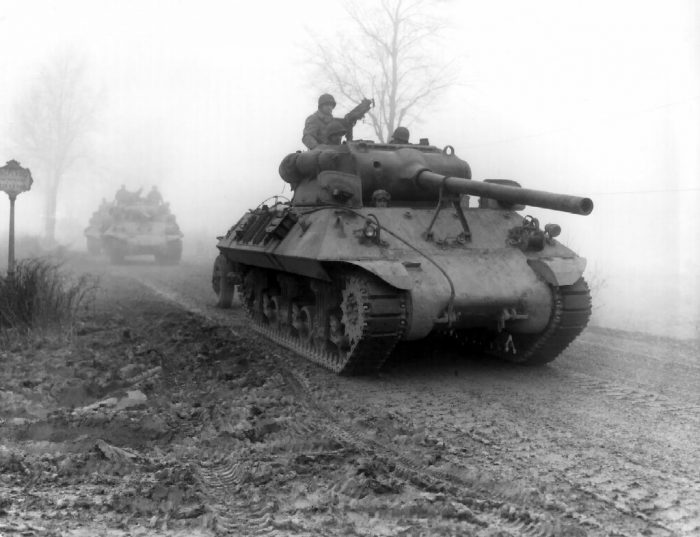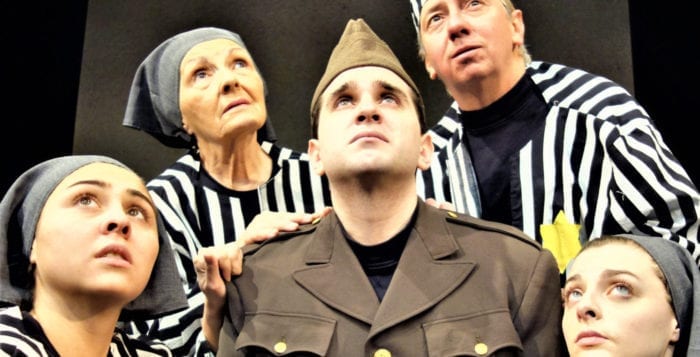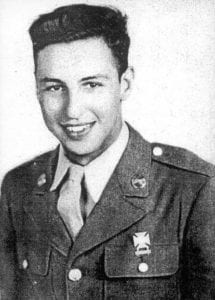“The same day I saw my first horror camp. It was near the town of Gotha [in Germany]. I have never felt able to describe my emotional reactions when I first came face to face with indisputable evidence of Nazi brutality and ruthless disregard of every shred of decency. Up to that time I had known about it only generally or through secondary sources. I am certain, however, that I have never at any other time experienced an equal sense of shock.” — Supreme Allied Cmdr. Gen. Dwight D. Eisenhower
At that moment almost 78 years ago, Hitler’s Third Reich was rapidly crumbling away.
This was in large part due to the massive strength of Eisenhower’s armies, which were determined to finish the war in Europe. With the end in sight, Allied soldiers entered German soil with the hope of receiving a speedy surrender. During this advance, American soldiers quickly noticed that the enemy had some notable similarities to their own countrymen.
The German population was similar in size to the American middle class, and lived in heated homes surrounded by picturesque natural beauty from the German and Austrian landscapes. As Allied forces continued their eastward push, however, any feelings of closeness with the enemy quickly evaporated, as they had come to learn of Hitler’s “final solution.” American soldiers, many from neighborhoods along Long Island’s North Shore, had discovered and liberated the German death camps.
For the men who witnessed this shocking brutality, these experiences would never be forgotten. Although hardened by the Battle of the Bulge and other combats against a fanatical resistance unwilling to surrender its losing cause, Americans were utterly unprepared for the scenes at these camps. Some had heard of the cruel treatment inflicted by the Nazis, but they were horrified after entering these camps. At once, the medics distributed food, water and medical treatment to save as many lives as they could.
After visiting the Ohrdruf concentration camp on April 12, 1945, a sickened Eisenhower said, “We are told the American soldier does not know what he is fighting for. Now, at least, we know what he is fighting against.” Renowned journalist and radio broadcaster Edward R. Murrow accompanied the American 6th Armored Division into the Buchenwald concentration camp. Laying witness to the atrocities, he reported, “I pray you to believe what I have said about Buchenwald. I have reported what I saw, but only part of it. For most of it I have no words. … If I’ve offended you by this rather mild account of Buchenwald, I’m not in the least sorry. I was there.”
“The inmates liberated by our forces were skeletons. … It was enough to make strong men weep — and some American officers did so unabashedly.”
— Robert Murphy
Diplomat Robert Murphy was also present to see the conditions of these camps. He recalled: “The inmates liberated by our forces were skeletons. … It was enough to make strong men weep — and some American officers did so unabashedly.” Many American soldiers were ordered to see these camps for themselves, as Eisenhower wished to prevent any future deniers of the Holocaust.Two local heroes
Among these soldiers was the late John D’Aquila, resident of Belle Terre. A member of the 11th Armored Division, he served under Gen. George S. Patton’s famed Third Army. D’Aquila was a native of Middletown, Connecticut, who landed in France during the Battle of the Bulge. As a medic, he was ordered toward the strategic Belgian town of Bastogne which was surrounded by German forces. During one of the worst winters in recorded history, D’Aquila treated wounded soldiers as they turned back this German offensive. For his valiance and unceasing treatment of wounded servicemen, D’Aquila received a Purple Heart after being wounded during this battle.
Like many other soldiers at the end of this war, D’Aquila wondered if he would survive. On May 5, 1945, the 11th Armored Division entered the Mauthausen concentration camp in Austria. By the end of the war, those camps in Central Europe had considerably higher death rates as they were the last to be captured by Allied forces. D’Aquila remembered the inability of the local Austrian citizens to accept responsibility for the savagery committed there, despite the stench of death that hung in the air, the piles of bodies stacked up “like cordwood.”
After the war, D’Aquila attended college and later earned a degree in law, where he defended the interests of insurance companies. Locally in Port Jefferson, he was on the board of directors of Theatre Three, and a play was later created by Jeffrey Sanzel, “From the Fires: Voices of the Holocaust.” Until his death, D’Aquila openly addressed his wartime experiences because he wanted to ensure that citizens, especially the youth, did not forget the severity of the Holocaust.
In 2008, D’Aquila described his experience of liberating Mauthausen during a Veterans Day program at Rocky Point High School. As though it had just occurred, D’Aquila spoke of his duty to medically care for the survivors of the concentration camp as they were finally being liberated. At another program at the high school, D’Aquila joined Werner Reich, who had survived Theresienstadt, Auschwitz and Mauthausen, and was liberated by the 11th Armored Division.
Reich was a 17-year-old young man who weighed only 64 pounds at the time of his liberation. In this condition, he was not expected to survive. At RPHS, he looked at the audience and vividly stated that if it had not been for Americans like D’Aquila, then he would have surely perished from starvation. Although from different backgrounds, both men were inextricably tied to one another through their shared experience of “man’s inhumanity to man.” For years, Reich has spoken to high schools across the North Shore to ensure that good people do not stand by when innocent people suffer from such atrocities.
Even though World War II ended long ago, the world now watches history repeat itself through the images of fighting in the Ukraine. Americans are again learning of the massive losses of Ukrainian civilians suspected of being killed by Russian forces. People such as D’Aquila and Reich made it their mission in life to alert people that history will repeat itself if good people do nothing. We must learn from the examples of the past, we must always act, protect and preserve the rights and freedoms of people everywhere.
Rich Acritelli is a history teacher at Rocky Point High School and adjunct professor at Suffolk County Community College.







